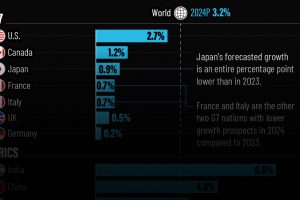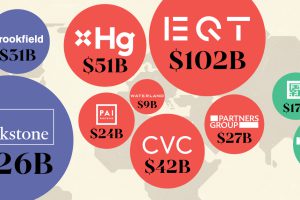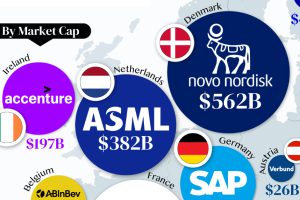Ranked: The 20 Easiest Countries for Doing Business
Contrary to popular belief, the hardest part about running a business may not be finding customers, it’s getting one started.
Depending on the public policies and application processes of your country, you might struggle or succeed in opening and operating a business.
If you live in New Zealand, for example, you can get a new enterprise up and running in half a day. If you live in Luxembourg or Argentina, however, it’s a different story─with the process sometimes taking over a year.
Today’s chart uses data from the World Bank’s annual Doing Business 2020 report, which delves into the ease of doing business in countries around the world.
Measuring the Ease of Doing Business
Now in its 17th year, the Doing Business (DB) report measures how easy it is for someone to start and run a company in an economy, using 12 key factors throughout a business lifecycle:
- Starting a business
- Employing workers
- Dealing with construction permits
- Getting electricity
- Registering property
- Getting credit
- Protecting minority investors
- Paying taxes
- Trading across borders
- Contracting with the government
- Enforcing contracts
- Resolving insolvency
Of the 190 countries reviewed last year, only 115 made it easier for entrepreneurs to do business.
Note to readers: this year’s DB score did not factor in Employing Workers or Contracting with the Government when ranking economies.
Top 20 Easiest Countries to Run a Business
| Rank | Country | DB Score |
|---|---|---|
| #1 | 🇳🇿 New Zealand | 86.8 |
| #2 | 🇸🇬 Singapore | 86.2 |
| #3 | 🇭🇰 Hong Kong | 85.3 |
| #4 | 🇩🇰 Denmark | 85.3 |
| #5 | 🇰🇷 South Korea | 84 |
| #6 | 🇺🇸 United States | 84 |
| #7 | 🇬🇪 Georgia | 83.7 |
| #8 | 🇬🇧 United Kingdom | 83.5 |
| #9 | 🇳🇴 Norway | 82.6 |
| #10 | 🇸🇪 Sweden | 82 |
| #11 | 🇱🇹 Lithuania | 81.6 |
| #12 | 🇲🇾 Malaysia | 81.5 |
| #13 | 🇲🇺 Mauritius | 81.5 |
| #14 | 🇦🇺 Australia | 81.2 |
| #15 | 🇹🇼 Taiwan | 80.9 |
| #16 | 🇦🇪 United Arab Emirates | 80.9 |
| #17 | 🇲🇰 North Macedonia | 80.7 |
| #18 | 🇪🇪 Estonia | 80.6 |
| #19 | 🇱🇻 Latvia | 80.3 |
| #20 | 🇫🇮 Finland | 80.2 |
In the top spot for the fourth year in a row, New Zealand only requires half a day to start a business. Singapore also stands out for having the shortest timeframe when it comes to paying business taxes and enforcing business contracts.
Only two African nations─Rwanda and Mauritius─are listed in the top 50 countries, with Mauritius being the only one to crack the top 20 list.
Latin American economies are noticeably missing from the rankings, as many countries in this region are fraught with bureaucracy and prolonged processes.
Most Improved Scores
Several developed and developing economies made significant strides in 2019 to implement reforms that opened doors for new business owners.
The Doing Business 2020 report shows that the cost of starting a business has fallen over time, particularly in developing economies.
Top 10 Most Improved Economies, 2018-2019

Saudi Arabia made the greatest improvement overall, adding 7.7 points to its score.
Bahrain also made improvements over the most number of factors (9). While Jordan showed improvement in the fewest factors (3), it showed the second highest jump in DB Score.
Gains Among Low-Income Countries
The DB 2020 study also shows that developing economies are making progress: it’s now cheaper than ever before to run a business in developing economies.
However, a significant disparity still remains when we consider the difference in business costs between high-income and low-income economies.
An entrepreneur starting a company in a low-income economy will spend about 50% of per capita income (PCI) to launch a venture, whereas an entrepreneur in a high-income economy spends only 4% PCI to accomplish the same task.
Put another way, entrepreneurs located in the bottom 50 economies spend an average six times more to open a new company as those in a high-income economy.
Entrepreneurship and Economic Growth
Generally, more entrepreneurs will enter a market where they can easily conduct business─adding more value to local economies.
While the rankings clearly illustrate the link between ease of doing business and economic growth, there are still significant barriers in place that not only deter entrepreneurship but also inhibit a relatively simple strategy for growth.





